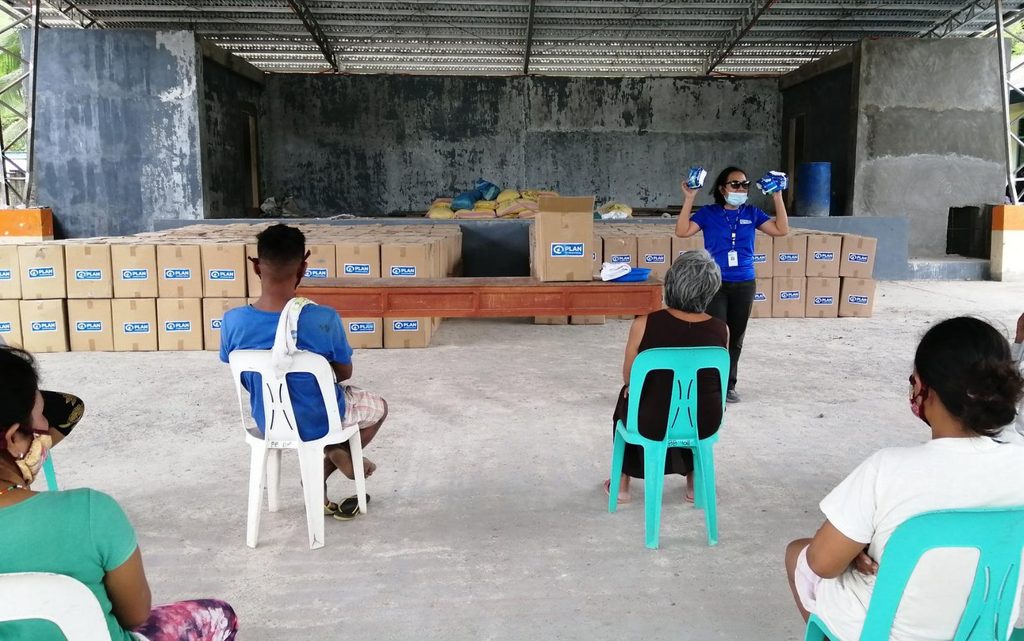Hope restored: Rodelyn's resilient recovery
After consecutive typhoons left Rodelyn’s family facing hunger and uncertainty, timely support and resilience efforts helped them find hope and begin rebuild…

Plan International Philippines is working with the government, private sector, civil society organisations and communities to reach vulnerable children, especially girls, in its response to the COVID-19 pandemic.
The COVID-19 pandemic is the worst health crisis of our generation. It is severely challenging the Philippines in the following ways:
Despite stringent physical distancing measures and increasing testing and treatment capacities, the Philippines remains the most unsafe country in the Asia-Pacific Region in respect of COVID-19.
We are supporting the needs of COVID-19 affected communities in 22 provinces and 1,055 villages or barangays for at least the next 6 months. We will provide:
“Populations already hit by typhoons and earthquakes are made more vulnerable by the pandemic and so it is critical that they continue to receive the assistance needed.” said Plan International Philippines Country Director Dennis O’Brien.
The pandemic has triggered false news, disinformation, misinformation, myths, and conspiracy theories that are impeding response actions.
We conducted a rapid information, communication, and accountability assessment to better understand communities’ understanding of the pandemic and information needs.
Out of 1,460 respondents, 62% identified rumours and false information on the nature of the virus, possible cures and rules regarding lockdowns and social distancing in their communities.
To ensure the right information is available to communities, we are collaborating with the Department of Health and government technology startup AI4GOV in developing the KontraCOVID chatbot, otherwise known as KIRA (Knowledge Informs Responsible Action). KIRA is an automated chatbot providing reliable and accurate COVID-19 information.
Populations already hit by typhoons and earthquakes are made more vulnerable by the pandemic.
A web-based triage system (www.kontracovid.ph) was also launched to enable users to ask about their symptoms and exposure, and receive appropriate advice.
“Innovations such as KIRA can significantly improve response effectiveness by providing the right information to people who need it, when they need it, through their mobile phones. We will continue to work with the government and private sectors to find the most effective ways to reach people.” said O’Brien.
We also use campaigns with community health workers, community-level information broadcasting through SMS, to share information and hear in real time whether we are meeting community needs.
Through pre-COVID-19 initiatives such as the Youth Reporter Project and the Girls Get Equal campaign, we are working with young people and girl leaders to produce digital communications products for raising awareness on COVID-19.
Werecognise thathealth crises affect girls and boys, women and men differently.
While children’s health appears less impacted by the COVID-19 pandemic than older adults, their education is interrupted, protection systems are disrupted and their families and communities are placed under stress by new health and economic burdens.
The COVID-19 pandemic, which has resulted in lockdowns and quarantine measures, has put children at heightened risk of violence at home and cut them off from protection services and support networks. In the Philippines, 60% of cases of child violence happened at home.
For some girls and young women, being stuck at home may also reduce the already limited access to menstrual hygiene products and adolescent-friendly sexual and reproductive health services.
“Our experience is that children, girls and young women are particularly hard-hit in emergencies. They are faced with disruption in education, increased risk of abuse and violence, and mental health risks,” said O’Brien.
We are working with the country’s biggest alliances of child rights organisations, including the Joining Forces Alliance to End Violence Against Children and the Child Rights Network, to ensure children and girls are not neglected in the government’s COVID-19 response.